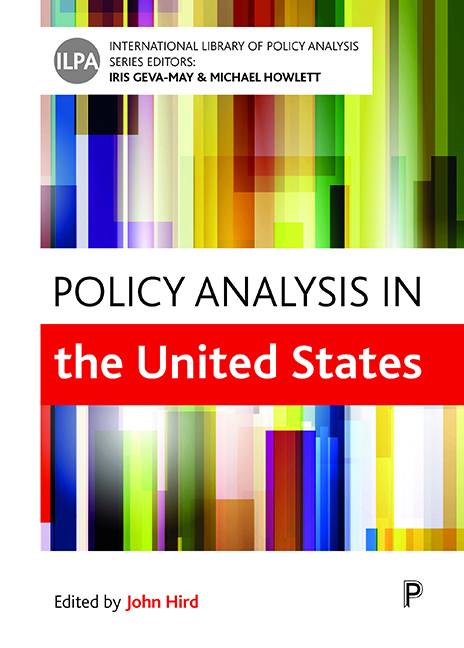Book contents
- Frontmatter
- Contents
- List of tables and figures
- Notes on contributors
- Editors’ introduction to the series
- Introduction
- Part One History, styles, and methods of policy analysis in the United States
- Part Two Policy analysis by governments
- Part Three Policy analysis outside of government
- Part Four Policy analysis education and impact internationally
- Index
Eleven - Political parties policy analysis
Published online by Cambridge University Press: 12 April 2022
- Frontmatter
- Contents
- List of tables and figures
- Notes on contributors
- Editors’ introduction to the series
- Introduction
- Part One History, styles, and methods of policy analysis in the United States
- Part Two Policy analysis by governments
- Part Three Policy analysis outside of government
- Part Four Policy analysis education and impact internationally
- Index
Summary
One of the most notable trends in contemporary American politics is the dramatic increase in the ideological polarization of the major political parties. Partisanship has always permeated political life, from the way citizens make choices at the ballot box to congressional roll call voting (for example Bartels 2000; Bond and Fleisher 2000). It should come as no surprise, then, that the ideologies associated with each party condition the set of policy prescriptions presented to the public. However, the increasingly strong connection between partisanship and ideology has transformed the politics of the policy process so that now policy analysis is screened less and less for its adherence to standards of objectivity and expertise and more for the ideological positions embraced by key constituencies within the parties. Compared with previous eras when the parties reflected greater ideological heterogeneity among their factions, the current ideological convergence among intraparty constituencies (particularly within the Republican Party) makes partisan decision makers less likely to rely on reputable expertise in pursuing policies. This partisan trend has critical implications for the use of solid policy analysis in government decision making.
To understand these transformations in the policy process, we propose an approach to understanding policy making and policy analysis through the structure of partisan politics. We view current changes in the party system as shaping the sources and uses of policy analysis. To get a handle on this shifting process, we conceive of political parties beyond their formal organizations (for example national committees or party caucuses), as extended networks of interest groups, think tanks, and other social organizations. These groups carry out the comprehensive task of analyzing and developing public policies, with the formal parties and their elected representatives adopting ideas that reflect the consensus view of the key factions within the party network. In this informational exchange, policy ideas emerge to the degree they adhere to the goals and interests of the extended party coalition—a coalition that has shifted over time, in both parties, to reflect highly ideological positions.
Throughout this chapter we will argue that the electorally oriented party organizations in the United States are not ‘doers’ of policy analysis. This is particularly salient in comparison with their European counterparts.
- Type
- Chapter
- Information
- Policy Analysis in the United States , pp. 205 - 222Publisher: Bristol University PressPrint publication year: 2018



